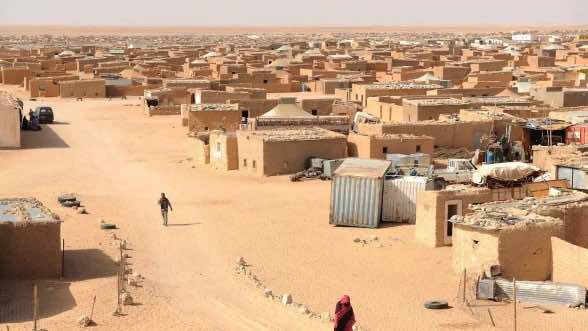The severe human rights violations in the Tindouf camps in southwestern Algeria were strongly condemned during the regular session of the UN’s Committee of 24 (C24), held from June 11 to 21 in New York.
“The Tindouf camps have become a brutal symbol of human suffering, where abuse, repression, extreme poverty, and malnutrition are the norm rather than the exception,” said Khadija Ezaoui, an activist and native of Laâyoune.
Ezaoui pointed out that humanitarian aid meant for the population in these camps is being diverted and sold in neighboring countries instead of reaching those in need. She noted that the leaders of the armed separatist group “Polisario” are systematically involved in this diversion with the active complicity of Algeria.
Supporting her claims, Ezaoui cited the latest revelations from the World Food Program (WFP) in its January 2023 report titled “Summary Report on the Evaluation of the Interim Strategic Plan for Algeria (2019-2022)” and the 2015 report from the European Anti-Fraud Office.
“The evidence provided by the WFP leaves no doubt, clearly establishing the diversion of essential food items, particularly biscuits intended for children as part of humanitarian aid,” she denounced, adding that these items are sold in local markets in Tindouf, outside the camps, and in neighboring countries.
Ezaoui highlighted that the WFP has exposed the obstruction of access for UN specialized agencies to the Tindouf camps and the biased distribution of humanitarian aid orchestrated by the “Polisario” armed group.
“This shocking situation is due to Algeria’s refusal to allow the UNHCR to register the population held hostage in the Tindouf camps, in accordance with its mandate and UN Security Council resolutions,” she stated, noting that the population in these camps continues to live in a “total zone of anarchy,” marked by multiple human rights violations, as Algeria has delegated its authority over the camps to the “Polisario.”
Ezaoui pointed out that the UN Human Rights Committee has repeatedly expressed grave concerns over this illegal delegation of powers, concerns echoed by the UN Secretary-General in his report to the Security Council.
She also denounced the abuses and atrocities endured by the population in the Tindouf camps when they claim their legitimate rights, mentioning that cases of slavery have been reported by several NGOs and media outlets.
“When the population dares to raise their voice against the abuses perpetrated by Algeria and the ‘Polisario,’ their legitimate demands are met with brutality and repression,” she lamented, citing the recent cases of three individuals who suffered arbitrary detention and torture at the hands of the “Polisario.”
Ezaoui also highlighted that women in the camps are subjected to various forms of violence by Algeria and its puppet “Polisario,” emphasizing that this situation calls for an immediate international response.
The activist called on the international community “to act swiftly and decisively to end this humanitarian catastrophe and to hold Algeria accountable for its refusal to comply with the urgent and strong calls from UN Security Council resolutions to register the population held hostage in the Tindouf camps.”
For Ezaoui, the only solution to this disastrous situation is the safe and dignified return of the population held in the Tindouf camps through the implementation of the Moroccan autonomy plan.





